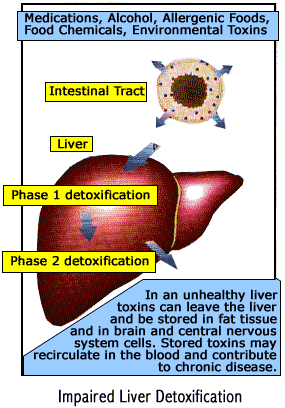Toxic Waste in Your Body?
What role does the liver play in detoxification?
The liver is a key organ in your body's self-defense system. It changes, or detoxifies, many harmful substances into forms which your body can safely eliminate.
How do these toxins get into the body?
In today's world of processed foods and pollution, toxic substances exist almost everywhere. They are in the food you eat, the water you drink (from fertilizers, chemicals and other additives such as colorings and preservatives), and the air you breathe (from automobile emissions, pesticides and industrial pollutants). Some of the body's own compounds must be detoxified as well.
How does the liver detoxify substances?

A healthy liver uses two mechanisms, called Phase 1, and Phase 2 detoxification, to remove toxins. In Phase 1, your body's enzymes activate toxic substances to make them more accessible to Phase 2. In Phase 2, other enzymes convert toxins to more water-soluable forms, which your body eliminates through urine or stool.
What happens during impaired liver detoxification?
An unhealthy liver does not detoxify substances as rapidly or as completely as a healthy liver. Slower detoxification results in more toxic substances circulating in the body. Unchanged or partially changed toxins are not easily eliminated and instead pass from the liver into the body. Eventually, the toxins are stored in fatty body tissue, including the brain and central nervous system cells. Stored toxins may be slowly released into the blood, contributing to many chronic illnesses.
How is liver function damaged?
A number of conditions affect how well the liver performs its detoxifying duties. Repeated exposure to chemicals and toxins in food, water and the environment increases the detoxification burden.
If you have a "leaky gut," your intestine allows large, undigested molecules to pass into the body. Increased amounts of toxic substances can travel throught the liver and overload its capacity to detoxity them.
How is liver function measured?
- One method to assess the liver's detoxifying ability is to examine the overall state of your health. Toxic substances are contributing factors in a wide range of health problems.
- You may have heard of several different liver tests (such as liver enzyme analysis) which look for clinical evidence of existing liver damage. Standard "liver function" tests measure levels of enzymes such as SGOT and SGTT. Unfortunately, by the time these tests register "abnormal," liver damage is already present.
- A definite assessment of function can be made using the Detoxification Profile. This test uses common substances to challenge the liver's detoxification ability using urine and saliva samples. You simply swallow the tablets, collect urine and saliva specimens, and return the test kit to Dr. Bachmans clinic. The specimins are analyzed, and the results are sent to your healthcare professional. The specific results can be used to develop a treatment plan.
In addition to detoxification testing, Dr. Bachman may want to test your level of oxidiative stress. Impaired liver function can lead to higher levels of free radicals, substances in the blood which have been linked to chronic illness. Analysis of a blood and/or urine sample provides important information about damage resulting from a dysfunctional liver.
